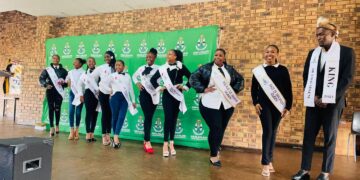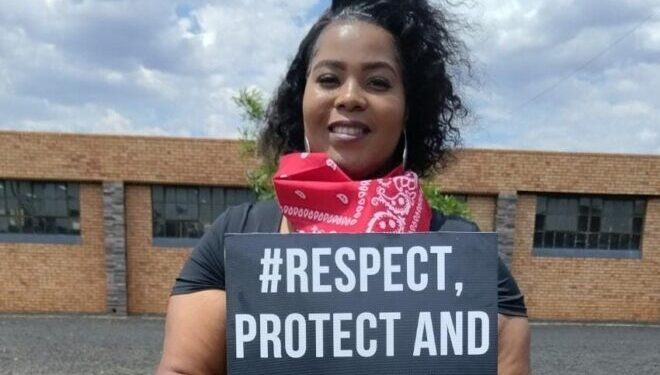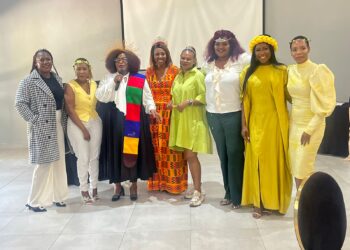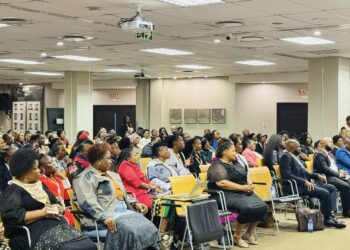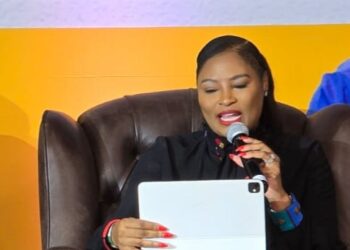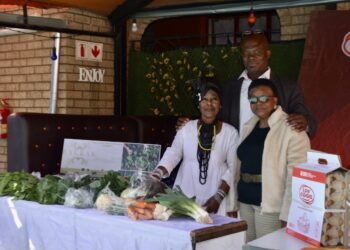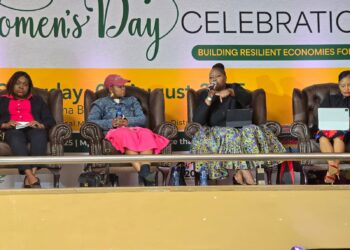Emalahleni- It was a regular day in August last year when Abongile Mcoki was assaulted by her sister’s partner at the time after he enquired about her sister’s whereabouts, which Mcoki refused to disclose. This was a nightmare that would forever alter the course of her life.
The assault left her battered and broken, both physically and emotionally. Laying in a hospital bed, bandaged and bruised, she faced not just the fight for her own survival, but the fight for justice in a system that often fails survivors. And in that moment, Mcoki committed to herself that her suffering would not be in vain.
“I knew right then and there that this is my purpose,” she says. “I should help others who do not have a voice.”
At 40, Mcoki chairs a non-profit organisation, All Voices Matter, which supports survivors of Gender-Based Violence and Femicide (GBVF) through advocacy and direct action.
She recalls the day of the assault, the 4th of August 2024, with measured breaths. “When you are hurt by someone you trusted, the betrayal cuts deeper than the wounds themselves,” she says. “As I lay there, unable to move, yet still expected to explain myself to the police, I realised the injustice in our system. Survivors have to fight for their dignity, often from a place of pain and vulnerability. I decided I would fight not only for me but for every woman who never got the chance.”
This was the genesis of her activism.
What it means to be a woman
For Mcoki, womanhood is about resilience, strength and the power to nurture and uplift others.
But it also carries the weight of history, marginalisation and the ongoing violence unleashed on women. “Being a woman means belonging to a community that has been both oppressed and powerful. It means standing up for justice not just for ourselves but for the generations that will come after us.”
When asked what she would change in the world, Mcoki doesn’t hesitate: patriarchy. “I would change the patriarchal systems and structures that perpetuate GBVF. Until we dismantle those, we cannot live in a world where women and girls are safe.”
For her, change must be both structural and cultural. “We need policies, yes. But we also need communities that refuse to normalise violence.”
Daily work and challenges of activism
Mcoki’s activism is hands-on and demanding. On any given day, she might be counselling a survivor, meeting with policymakers, or mobilising community members through workshops and marches.
“My activism is hands-on,” she says. “It’s working directly with survivors, raising awareness, and challenging government structures to take GBVF seriously. It’s exhausting work, but necessary.”
The fight is not easy. “The biggest challenges are resistance from patriarchal systems, lack of resources, and the emotional toll of working with survivors,” she admits.
There is also the constant weight of misconceptions. “People still think feminism is about hating men. They think GBVF activism is only about women. But what we’re fighting for is equality, justice and safety for everyone.”
Facing societal resistance and systemic obstacles, Mcoki sees both culture and government as battlegrounds for change. “Culture and tradition can either be tools of liberation or chains of oppression,” she explains. “When they are used to silence women or justify violence, they are harmful. But culture can also be redefined to celebrate respect, love and equality.”
Her frustration with institutions is equally clear. “Unfortunately, I don’t think the government and institutions are doing enough. Crime is too comfortable in South Africa—it’s our normalcy. Every day a body is discovered, and yet, we do not treat GBVF as the national disaster it truly is.”
She calls for bold action: a Declaration of a National Disaster. “We are tired of being told to carry pepper spray, to send our location every 30 minutes. We want the violence to STOP.”
Mcoki believes in survivor centred policies—ones that prioritise care, skills empowerment, and swift justice. “We need to hold perpetrators accountable, but we also need to address root causes: patriarchy, poverty, and inequality.”
The emotional toll of activism is heavy. “I practice self-care through mindfulness, rest, and joy,” she explains. “And I trust my colleagues at All Voices Matter to carry the work when I step back. Burnout is real—we can’t help others if we’re empty.” Even with preparation, her dedication has drawn backlash—criticism, online harassment, even threats. “It’s scary,” she admits. “But I handle it by prioritising my safety and remembering why I started. Survivors’ lives matter more than trolls.”
Mcoki’s words to survivors are tender yet firm: “You are not alone, and you are not to blame. Your experiences are valid, and your voices matter. Don’t give up hope—there are people who care, who listen, and who want to support you. You deserve to live a life free from violence and fear.”
For those who want to join the fight, her advice is practical: “Educate yourself. Get involved with local organisations. Listen to survivors and amplify their voices. Use your privilege to challenge harmful norms. And above all, take care of yourself. This work is heavy, but it’s worth it.”
Mcoki’s journey from survivor to activist is more than a personal story—it reflects South Africa’s ongoing crisis and the urgent need for change. Through All Voices Matter, she ensures that survivors find solidarity, support, and strength.
“I dream of a society where women and girls can live without fear,” she says softly, almost like a prayer. “A society where their voices are heard, valued, and protected. Because all voices truly do matter.”
Mcoki is not just living her purpose—she is redefining what it means to rise from tragedy, to turn wounds into weapons of justice, and to create a future where resilience becomes a collective victory, not just an individual survival.










